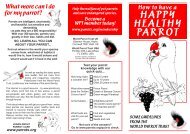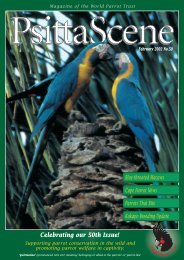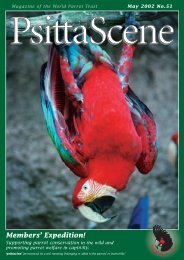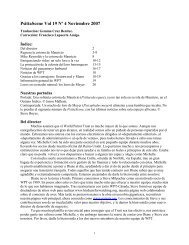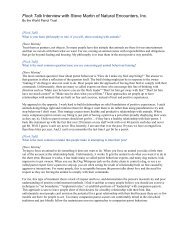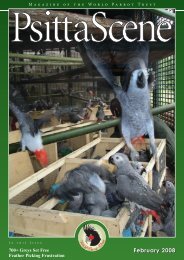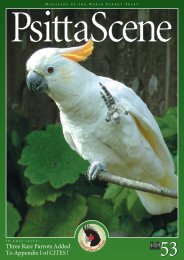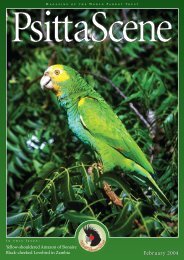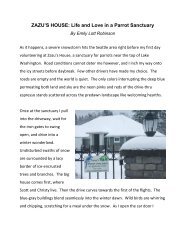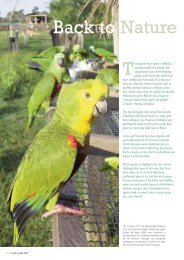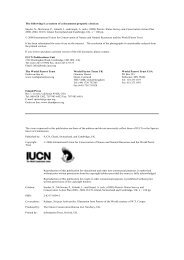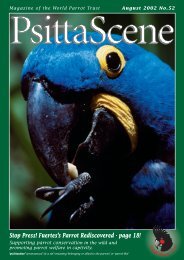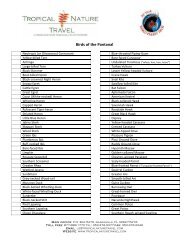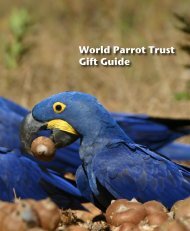Download - World Parrot Trust
Download - World Parrot Trust
Download - World Parrot Trust
You also want an ePaper? Increase the reach of your titles
YUMPU automatically turns print PDFs into web optimized ePapers that Google loves.
An Island Diary<br />
by GLEN HOLLAND.<br />
Put an Australian, a South African and two Kiwis (one of whom is of half Irish and the<br />
other person of half Chinese descent), on an island for two weeks and ... No not the start<br />
of a good joke, rather an expedition to capture and transfer female Kaka from Codfish<br />
Island to a mainland population at the Nelson Lakes. Project Leader, Ron Moorhouse, is<br />
currently studying the success of predator control around Kaka nest sites in relation to<br />
fledging success and required the females to boost his mainland study population of 5<br />
breeding pairs and numerous spare males. Ron’s assistant Les Morran, Matthew Low, an<br />
Australian Vet and I were the other team members. With this combination of nationalities<br />
we decided it would be safer to avoid the topics of cricket and rugby!<br />
After checking ourselves for<br />
seeds and dirt stuck on our<br />
clothing and shoes, and being<br />
informed how to ensure we did<br />
not carry any rodents in our<br />
baggage, we were cleared to<br />
leave. Within minutes the<br />
chopper was approaching and<br />
soon we had our mountain of<br />
food, capture equipment and<br />
general baggage loaded roof<br />
high in the chopper. Twenty<br />
minutes later we landed just<br />
above the high water mark on<br />
the island. A quick flurry of offloading<br />
and the chopper was<br />
gone. Immediately thereafter I<br />
began to feel that this was<br />
somewhere special, a pristine<br />
environment and no sound apart<br />
from the waves and the birds.<br />
While wheelbarrowing the<br />
equipment to the hut, we had<br />
the first Kaka flying overhead,<br />
calling loudly. While wandering<br />
around the hut to survey the gas<br />
and water supply, I was met by<br />
an excited family of brown<br />
creeper and a red-crowned<br />
Kakariki which remained hidden,<br />
chattering continually from a<br />
thicket.<br />
The first afternoon and<br />
following morning were spent<br />
constructing the aviary which<br />
was to house the Kaka prior to<br />
their transfer.<br />
The following morning we set<br />
off to locate and prepare a<br />
capture site for Kaka. Firstly we<br />
required a gap in the canopy of<br />
the forest with tall emergent<br />
anchor trees at each end - not<br />
too far off close apart and<br />
sufficient perching trees<br />
alongside the capture site. After<br />
hours of searching and then a<br />
days work on preparing the site<br />
to ensure the net would not<br />
snag on surrounding trees, we<br />
Kaka at Kapiti Island, New Zealand.<br />
finally had the first of what<br />
would be many sites ready. A<br />
laborious process which Ron<br />
and Les were obviously well<br />
accustomed to, Matt and I were<br />
getting rather anxious at having<br />
been on the island for a few<br />
days but still not having caught<br />
a Kaka yet. Finally the<br />
conditions were just right - not<br />
too much sun, no wind and Kaka<br />
calling in the area. Hidden under<br />
camouflage nets, Ron turned on<br />
the audio system and soon we<br />
had the sounds of Kaka echoing<br />
Photo: Rosemary Low<br />
through the forest. Almost<br />
immediately a group of Kaka<br />
arrived to investigate the<br />
commotion and suddenly a bird<br />
dropped from the canopy<br />
straight into the net. The net<br />
was carefully lowered and<br />
amongst a host of growling and<br />
clicking sounds the bird was<br />
carefully removed from the net.<br />
The rest of the flock became<br />
quite agitated and their loud<br />
“kraak” alarm calls echoed about<br />
us, The large size of the bird<br />
and in particular its bill, was<br />
indicative that it was a male and<br />
he was released. The birds, the<br />
forest and our team then settled<br />
until the speakers were working<br />
again and the air was again<br />
filled with Kaka calls. Two tui<br />
aggressively chasing each other<br />
resulted in one bird in the net.<br />
As I approached the bird, Ron<br />
shouted “don’t need to warn you<br />
about its claw!” ... Hang! I<br />
thought I had just taken a Kaka<br />
out of the net and he is worried<br />
about a little tui. I felt my eyes<br />
begin to water and the pain was<br />
unbelievable as the tui sank its<br />
needle sharp claws into my<br />
hands, and pierced the quick of<br />
my finger nail. After Les<br />
“purring” to the bird, while it lay<br />
on its back, Ron called us to<br />
lower our end of the net. After<br />
some discussion it was decided<br />
that we needed a recording of<br />
the local Kaka dialect which<br />
differed considerably from the<br />
Nelson Lakes dialect we were<br />
using and both differed<br />
considerably from the North<br />
Island birds with which I was<br />
familiar. After a series of<br />
capture sites, each of which<br />
took a least a day to prepare<br />
and the use of the recorded<br />
local dialect which Ron managed<br />
to obtain we had our four<br />
females in the aviary. We had<br />
caught a number of birds which<br />
were clearly male, their large<br />
beaks identifiable even when<br />
hovering above us in the nets,<br />
but we also released a number<br />
of birds which we felt were<br />
female but their beak<br />
measurements fell outside the<br />
parameters for females. One<br />
male had a bill length of 58mm,<br />
the largest Ron had recorded<br />
and he felt that all these birds<br />
were possibly a little larger than<br />
their more northern cousins.<br />
Yellow and red-crowned<br />
Kakariki, tui (which I now<br />
respected) and bellbirds were all<br />
part of the by-catch which were<br />
released.<br />
As the helicopter turned us<br />
away from the group of friends<br />
on the beach, I had mixed<br />
feelings of pleasure at the<br />
thought of getting back to see<br />
my family, a piece of me<br />
wanting to remain and some<br />
trepidation at what was waiting<br />
for me in my in-tray at work.<br />
This experience however gave<br />
me great insight into some of<br />
the diversity which exists in<br />
New Zealand.<br />
PsittaScene Volume 11, No 3, August 1999 ■ 7



